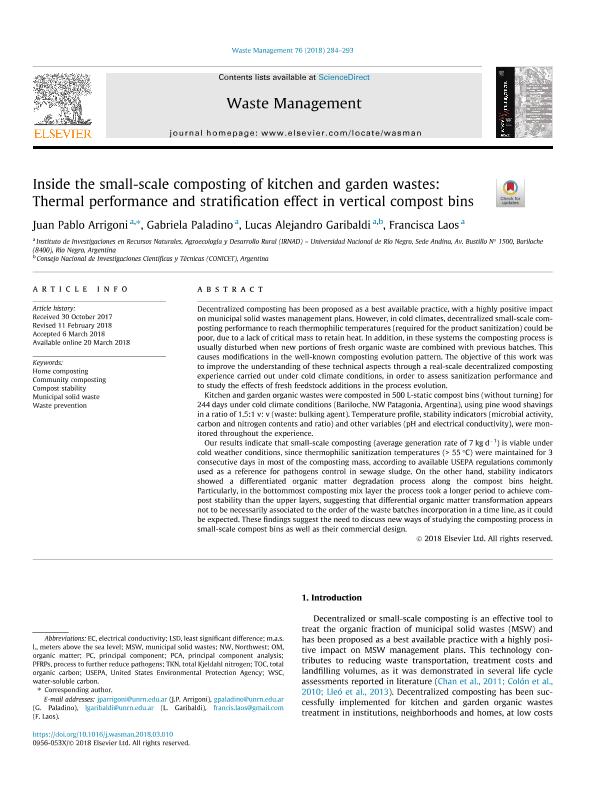Mostrar el registro sencillo del ítem
dc.contributor.author
Arrigoni, Juan Pablo

dc.contributor.author
Paladino, Gabriela Lucía

dc.contributor.author
Garibaldi, Lucas Alejandro

dc.contributor.author
Laos, Francisca

dc.date.available
2020-08-25T14:50:05Z
dc.date.issued
2018-06
dc.identifier.citation
Arrigoni, Juan Pablo; Paladino, Gabriela Lucía; Garibaldi, Lucas Alejandro; Laos, Francisca; Inside the small-scale composting of kitchen and garden wastes: Thermal performance and stratification effect in vertical compost bins; Pergamon-Elsevier Science Ltd; Waste Management (elmsford); 76; 1; 6-2018; 284-293
dc.identifier.issn
0956-053X
dc.identifier.uri
http://hdl.handle.net/11336/112316
dc.description.abstract
Decentralized composting has been proposed as a best available practice, with a highly positive impact on municipal solid wastes management plans. However, in cold climates, decentralized small-scale composting performance to reach thermophilic temperatures (required for the product sanitization) could be poor, due to a lack of critical mass to retain heat. In addition, in these systems the composting process is usually disturbed when new portions of fresh organic waste are combined with previous batches. This causes modifications in the well-known composting evolution pattern. The objective of this work was to improve the understanding of these technical aspects through a real-scale decentralized composting experience carried out under cold climate conditions, in order to assess sanitization performance and to study the effects of fresh feedstock additions in the process evolution. Kitchen and garden organic wastes were composted in 500 L-static compost bins (without turning) for 244 days under cold climate conditions (Bariloche, NW Patagonia, Argentina), using pine wood shavings in a ratio of 1.5:1 v: v (waste: bulking agent). Temperature profile, stability indicators (microbial activity, carbon and nitrogen contents and ratio) and other variables (pH and electrical conductivity), were monitored throughout the experience. Our results indicate that small-scale composting (average generation rate of 7 kg d-1) is viable under cold weather conditions, since thermophilic sanitization temperatures (> 55 °C) were maintained for 3 consecutive days in most of the composting mass, according to available USEPA regulations commonly used as a reference for pathogens control in sewage sludge. On the other hand, stability indicators showed a differentiated organic matter degradation process along the compost bins height. Particularly, in the bottommost composting mix layer the process took a longer period to achieve compost stability than the upper layers, suggesting that differential organic matter transformation appears not to be necessarily associated to the order of the waste batches incorporation in a time line, as it could be expected. These findings suggest the need to discuss new ways of studying the composting process in small-scale compost bins as well as their commercial design.
dc.format
application/pdf
dc.language.iso
eng
dc.publisher
Pergamon-Elsevier Science Ltd

dc.rights
info:eu-repo/semantics/openAccess
dc.rights.uri
https://creativecommons.org/licenses/by-nc-sa/2.5/ar/
dc.subject
HOME COMPOSTING
dc.subject
COMMUNITY COMPOSTING
dc.subject
COMPOST STABILITY
dc.subject
MUNICIPAL SOLID WASTE
dc.subject.classification
Otras Ingeniería del Medio Ambiente

dc.subject.classification
Ingeniería del Medio Ambiente

dc.subject.classification
INGENIERÍAS Y TECNOLOGÍAS

dc.title
Inside the small-scale composting of kitchen and garden wastes: Thermal performance and stratification effect in vertical compost bins
dc.type
info:eu-repo/semantics/article
dc.type
info:ar-repo/semantics/artículo
dc.type
info:eu-repo/semantics/publishedVersion
dc.date.updated
2019-10-15T17:55:41Z
dc.journal.volume
76
dc.journal.number
1
dc.journal.pagination
284-293
dc.journal.pais
Estados Unidos

dc.description.fil
Fil: Arrigoni, Juan Pablo. Universidad Nacional de Río Negro. Sede Andina. Instituto de Investigaciones en Recursos Naturales, Agroecología y Desarrollo Rural; Argentina. Consejo Nacional de Investigaciones Científicas y Técnicas. Centro Científico Tecnológico Conicet - Patagonia Norte; Argentina
dc.description.fil
Fil: Paladino, Gabriela Lucía. Universidad Nacional de Río Negro. Sede Andina. Instituto de Investigaciones en Recursos Naturales, Agroecología y Desarrollo Rural; Argentina. Consejo Nacional de Investigaciones Científicas y Técnicas. Centro Científico Tecnológico Conicet - Patagonia Norte; Argentina
dc.description.fil
Fil: Garibaldi, Lucas Alejandro. Universidad Nacional de Río Negro. Sede Andina. Instituto de Investigaciones en Recursos Naturales, Agroecología y Desarrollo Rural; Argentina. Consejo Nacional de Investigaciones Científicas y Técnicas. Centro Científico Tecnológico Conicet - Patagonia Norte; Argentina
dc.description.fil
Fil: Laos, Francisca. Universidad Nacional de Río Negro. Sede Andina. Instituto de Investigaciones en Recursos Naturales, Agroecología y Desarrollo Rural; Argentina
dc.journal.title
Waste Management (elmsford)

dc.relation.alternativeid
info:eu-repo/semantics/altIdentifier/url/https://www.sciencedirect.com/science/article/pii/S0956053X18301521
dc.relation.alternativeid
info:eu-repo/semantics/altIdentifier/doi/http://dx.doi.org/10.1016/j.wasman.2018.03.010
Archivos asociados
